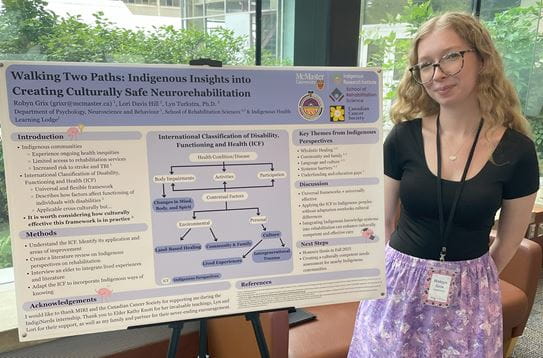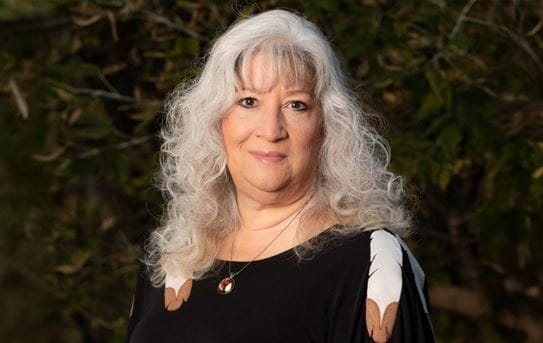The IndigiNerds Research Internship supports Indigenous students in pursuing cancer research, with funding from the Canadian Cancer Society.
3 min. read
Ever since Robyn Grix was treated for a rare tumour as a child, she's wanted to give back to the cancer cause in some way. She has lost family members to cancer and witnessed the strength and resilience of loved ones – like her dad, who is a cancer survivor, and her grandfather, who recently completed treatment.
An urban Anishinaabe woman with mixed ancestry, Robyn is now entering her fourth year at McMaster University. When she found out about IndigiNerds, a research internship hosted by the McMaster Indigenous Research Institute with a new cancer research stream funded by the Canadian Cancer Society (CCS), she knew she wanted to apply.
“I’ve seen the impact of cancer close up from a young age, these experiences have deeply influenced me,” she says. “I’m driven by the hope that my work can contribute to better care, better outcomes, and ultimately, more healing for families like mine.”
An urban Anishinaabe woman with mixed ancestry, Robyn is now entering her fourth year at McMaster University. When she found out about IndigiNerds, a research internship hosted by the McMaster Indigenous Research Institute with a new cancer research stream funded by the Canadian Cancer Society (CCS), she knew she wanted to apply.
“I’ve seen the impact of cancer close up from a young age, these experiences have deeply influenced me,” she says. “I’m driven by the hope that my work can contribute to better care, better outcomes, and ultimately, more healing for families like mine.”

Robyn and her research poster for the IndigiNerds Canadian Cancer Society stream
Contributing to Indigenous health and wellbeing
Guided by her research supervisors, Dr Lyn Turkstra and Professor Lori Davis Hill, Robyn’s research project explores how Indigenous ways of knowing can enhance Western rehabilitation models like the World Health Organization’s International Classification of Functioning, Disability, and Health (ICF).
“I hope this project contributes to the development of culturally-grounded and safe care for Indigenous people, creating spaces where they feel respected, supported and empowered to heal from cancer,” Robyn says.
Professor Davis Hill, who is Oneida, Wolf Clan from Six Nations of the Grand River and Assistant Professor of Indigenous Health, was the first Indigenous Speech Language Pathologist trained in Canada. Her research shares the experiences of community members in their access to culture and language, and how that impacts their identity and wellbeing.
“My research is in the analysis phase, and it is exciting to see themes emerging from the stories through Robyn’s eyes as well as my own,” Professor Davis Hill says. “The program is an opportunity to share a combination of clinical skills as a speech language pathologist with traditional knowledge.”
“My research is in the analysis phase, and it is exciting to see themes emerging from the stories through Robyn’s eyes as well as my own,” Professor Davis Hill says. “The program is an opportunity to share a combination of clinical skills as a speech language pathologist with traditional knowledge.”

Professor Lori Davis Hill
A one-of-a-kind emerging scholar program
The IndigiNerds Research Internship is specially designed for Indigenous students who are interested in research, and reflects the unique lived experiences and goals of students who participate.
IndigiNerds begins with an intensive training week covering research skills, writing and graduate school workshops. Students and supervisors mentor each other, and students learn how to navigate being Indigenous in academia, setting them up for success in their future endeavours.
“The IndigiNerds Canadian Cancer Society Stream can help to bridge the gap between up-and-coming Indigenous scholars and cancer research – establishing culturally competent and safe cancer research, treatment and care for our communities,” says junior researcher and program coordinator Justice Ryan.
Since the start of the cancer stream in summer 2025, the program has seen an increase in Indigenous STEM applicants and those expressing interest in cancer harm reduction and cancer prevention research.
IndigiNerds begins with an intensive training week covering research skills, writing and graduate school workshops. Students and supervisors mentor each other, and students learn how to navigate being Indigenous in academia, setting them up for success in their future endeavours.
“The IndigiNerds Canadian Cancer Society Stream can help to bridge the gap between up-and-coming Indigenous scholars and cancer research – establishing culturally competent and safe cancer research, treatment and care for our communities,” says junior researcher and program coordinator Justice Ryan.
Since the start of the cancer stream in summer 2025, the program has seen an increase in Indigenous STEM applicants and those expressing interest in cancer harm reduction and cancer prevention research.
A transformative experience
“My IndigiNerds experience was honestly phenomenal,” says Robyn, who is exploring a future in both healthcare and research. “It gave me the confidence to take on my upcoming fourth-year thesis and helped me consider graduate school as a real possibility. While I’m still exploring my path in healthcare, this program has brought me clarity and direction.”
To CCS donors who make programs like the IndigiNerds cancer stream possible, Robyn says: “Chi-miigwech for your generosity. Your donations not only help students like me pursue our career goals, but also empower us to give back as future Indigenous healthcare providers. Every contribution, no matter the amount, truly makes a difference.”
To CCS donors who make programs like the IndigiNerds cancer stream possible, Robyn says: “Chi-miigwech for your generosity. Your donations not only help students like me pursue our career goals, but also empower us to give back as future Indigenous healthcare providers. Every contribution, no matter the amount, truly makes a difference.”
Help create a future without cancer
With support from readers like you, we can continue to make a meaningful impact for people affected by cancer.
We are determined to increase survival, stop cancer before it starts, and improve lives. But we can’t do it without you.
If everyone reading this gave just $5, we could achieve our goal this month to fund the most promising research, compassionate support and transformative advocacy. Please give today because every contribution counts. Thank you.
